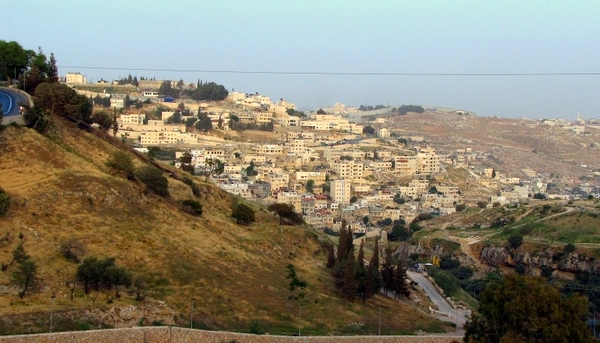|
In this mailing:
by Khaled Abu Toameh
• June 20, 2016 at 5:00 am
- The renewed
campaign against Palestinians suspected of selling real estate to
Jews is also part of the belief that the entire land is
Muslim-owned, and no Muslim is entitled to give up even one inch of
it to a non-Muslim. In other words, it is forbidden for a Muslim to
sell his home or land to a Jew or Christian. This would be the nail
in the coffin of any Palestinian leader who attempts to make any
territorial compromise as part of a peace agreement with Israel.
- This campaign
has raised fears that Palestinians may resume extrajudicial
executions of suspected land dealers.
- "The land
dealers should know that they would not be able to avoid earthly and
life punishment. Not only will they not be buried in Islamic
cemeteries, but their entire families will also be punished and it
would be forbidden to marry or to deal in any way with their family
members." — Palestinian National Work Commission in Jerusalem.
- This campaign
undermines Palestinians' long-standing claim that Jews
"illegally seize" Arab-owned houses and land in Jerusalem.
It seems that rather than illegal seizure, Jews have been paying
willing Arabs cold hard cash for the properties.

In 2014, following reports that Palestinians had sold
houses in Jerusalem's Silwan neighborhood (pictured above) to Jews,
Palestinian Authority President Mahmoud Abbas issued an executive order
that amended sections of the penal code related to real estate
transactions, and increased punishments for selling land to "hostile
countries" and their citizens. (Image source: Wikimedia
Commons/Gilabrand)
A Palestinian Muslim who commits the "crime" of selling
property to Jews should not expect to be buried in an Islamic cemetery.
Marriage to local Palestinians will no longer be an option for this
criminal's family members, and any weddings the family makes will have no
guests attending.
Both the living and the dead, then, will pay the price for such
"treason."
This is only a sampling of the punitive measures that will now be
faced by Palestinian residents of Jerusalem who are involved in real
estate transactions with Jews.
The latest measures were recently announced by a group of
Palestinian activists in east Jerusalem, as part of a renewed campaign
against Palestinians who are found guilty of selling a home or plot of
land to a Jewish individual or organization.
by Shmuel Bar
• June 20, 2016 at 4:30 am
- In Saudi
Arabia, Mohammad bin Salman's "Vision 2030" is totally
identified with his leadership. If it succeeds, he will harvest the
praise; on the other hand, many in the Saudi elite will latch on to
any sign of failure of his policies in order to block his ambitions.
- Mohammad bin
Salman's social-political agenda to broaden the power base of the
regime to include the young and educated -- and to a great extent
relatively secular or moderate -- will certainly be seen by the
Wahhabi clerics and the tribal social conservatives as geared
towards reducing their control over the populace and hence their
weight in the elite.
- Another serious
risk is that the economic plan entails reducing the Saudi welfare
state. The economic and social fallout of weaning the Saudis away
from entitlements will be exploited by domestic opposition elements
and by Iran.
- In Iran,
the electoral process within the Assembly showed what was not
evident during the parliamentary elections held in February, namely
that even a formal preeminence of moderates does not and cannot
influence the decision making of the Iranian regime and that
Khamenei succeeds to pull the strings despite seemingly democratic
procedures.
- After having
won the chairmanship of the Assembly, Jannati delivered a speech
demanding total loyalty to Khamenei, which can be considered as
targeting the moderates.

Saudi Prince Mohammed bin Salman meets with U.S.
Secretary of State John Kerry in Riyadh, Saudi Arabia, on May 7, 2015.
(Image source: U.S. State Department)
Following the announcement of Saudi Arabia's "Vision 2030"
Economic Plan by Deputy Crown Prince Muhammad bin Salman on April 25,
King Salman announced a reshuffling of the government. The reshuffling
was clearly orchestrated by the Deputy Crown Prince and reflects his
agenda. This shuffle probably is not the last word even in the near term;
the changes in the government strengthen the political position of
Mohammad bin Salman, because the new ministers owe him their posts, and
through them he will strengthen his hold on the levers of government,
especially in the economic sphere. His next step may be to move to
neutralize Prince Mitab bin Abdullah, the minister in charge of the Saudi
Arabian National Guard (SANG) and a close ally of Crown Prince Mohammad
bin Nayef. He could do this by absorbing SANG into the Ministry of
Defense.
|































No comments:
Post a Comment